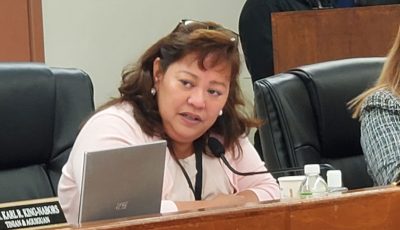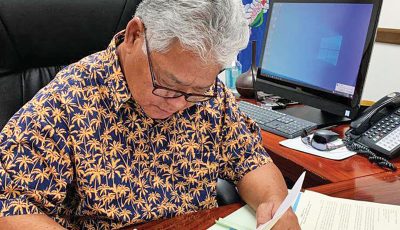Monthly revenue reports required in FY 2020 budget
Among several Senate changes to the fiscal year 2020 budget that Gov. Ralph DLG Torres will have to look at include having the Department of Finance submit monthly reports in order to keep track of finances throughout the fiscal year.
In their House-approved version of the budget bill, the Senate required the Finance secretary to submit monthly reports to the Legislature comparing actual revenues collected and estimated revenues; actual expenditures and appropriated expenditures; and quarterly reports of funds transferred out.
The amendment, which Sen. Sixto K. Igisomar (R-Saipan) championed at the Senate, was adopted by the House of Representatives in their session last Friday, Sept. 6, 2019.
The budget bill’s author, Rep. Ivan A. Blanco (R-Saipan), told Saipan Tribune that he supported the new reporting requirement to help paint a clearer picture for future budget bills.
“There were several clauses inserted in the recently passed budget to ensure timely financial information be provided to the presiding officers of the Legislature after each quarter. We felt such information would serve the Legislature better with up-to-date information, rather than waiting for the end of the fiscal year,” he told Saipan Tribune. “While we understand this is an additional burden on the Department of Finance and Office of Management and Budget, we felt timely financial information gives legislators a clearer and timely financial information to make well-informed decisions.”
Other Senate amendments that the House also adopted included the preparedness for Medicaid reimbursement at the federal level.
In anticipation of the possible reimbursement of Medicaid funds through H.R. 2328, which is set to start in fiscal year 2020, the budget bill also redirects the expected $5.32 million to the Public School System.
The House also approved Senate changes that included allocating $1.3 million from the CW fee funds to the newly created Northern Marianas Technical Institute for its curriculum, apprenticeships, and other training programs, provided, however, that NMTI also offer classes on Rota and Tinian through these islands’ high schools.
It also mandates that $600,000 of the CW fees go to PSS for their Career and Technical Education Program in their high schools; $500,000 would go to the Northern Marianas College for vocational education, apprenticeships, or other training programs provided that $50,000 of the funds allocated to NMC shall be used for the college’s nursing program equipment and supplies; and the remaining $100,000 would go to the Department of Commerce, Statistics Division for the CNMI prevailing wage study.
U.S. Public Law 115-218 stated that the funds collected from the CW fees shall only fund vocational education programs, apprenticeships, or other training programs geared toward training future U.S. workers. In line with the federal mandate, the Senate disallowed any reallocations or re-appropriations of the mentioned funds for other purposes through the budget bill.
The fiscal year 2020 budget bill is currently on the governor’s desk for review. The governor has until Sept. 30, 2019, to act on the legislation. Failure to enact a budget by the deadline will result in a partial shutdown of the CNMI government until a budget is enacted.



























